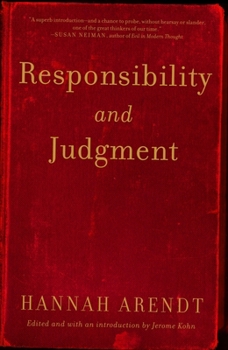Responsibility and Judgment
Select Format
Select Condition 
Book Overview
Responsibility and Judgment gathers together unpublished writings from the last decade of Arendt's life, where she addresses fundamental questions and concerns about the nature of evil and the making of moral choices. At the heart of the book is a profound ethical investigation, "Some Questions of Moral Philosophy," in which Arendt confronts the inadequacy of traditional moral "truths" as standards to judge what we are capable of doing and examines...
Format:Paperback
Language:English
ISBN:0805211624
ISBN13:9780805211627
Release Date:August 2005
Publisher:Schocken Books Inc
Length:336 Pages
Weight:0.15 lbs.
Dimensions:0.9" x 6.3" x 8.2"
Customer Reviews
5 ratings
astute observations!
Published by Thriftbooks.com User , 15 years ago
I'd imagine that every political philosopher knows of Hannah Arendt. Born in Germany in 1906, she moved to France and eventually the USA after Hitler's rise to power. She has written numerous books over 3 1/2 decades and she has taught at places like Princeton, Chicago, and Berkeley. She struggles with and argues ultimately against responsibility of many of the common German people who went with the flow or just followed orders. Responsibility must be focused upon those who had authority and committed atrocities - the so called desk top murderers, like Eichmann and Himmler. She questions how we can set ourselves up to place judgment upon these individuals responsible, in part, for such horrific crimes. Included in this text is her presentation on American responsibility for Vietnam and the uprising of individuals against a war of questionable justice ultimately. She's a brilliant speaker and writer, very heavily influenced by the Kantian school. While the vast majority of this text is very readable, there are a few passages that I had to re-read - "did she really say that?" or "what ...". Since Theory of Justice was published, it sort of makes these books obsolete, but, they are, nevertheless, worth while reading for background. I give this text a solid A. It comes highly recommended.
Outstanding Work on Responsibility
Published by Thriftbooks.com User , 15 years ago
What would you do under a dictatorship? Arendt poses this question for all of us in her collection of essays dealing with the relationship between the individual and the state--in particular, what can the individual do in a system that is evil. Similar to a number of writers in circumstances not unlike her own (Remarque, Silone, Bonhoeffer) she argues that we each have the capability to retain our own sense of goodness and avoid the "banality of evil" she found with Eichmann.
Great book, lousy introduction
Published by Thriftbooks.com User , 17 years ago
Hannah Arendt has always been one of my favourite writers. This volume collecting her works does not disappoint. However, do not expect the same incisive and indepth look into the pressing ethical issues here. This is not the fault of Hannah Arendt. This is afterall a collection of bits and pieces of her works, put together not necessarily in a coherent way. Nonetheless, this book is worth a read, particularly as it condenses and crystalises some of the thoughts contained in her other, longer, and more difficult to read books. Next to her "Men in Dark Times", I would recommend this book as a good place for those unfamiliar with Hannah Arendt to begin. However, do ignore the introduction by Jerome Kohn, which is rather a rather incoherent, bitter, and ranting little piece of work, attributing to Hannah Arendt thoughts and opinions that might or might not have been hers. It is better for the reader to judge for himself or herself as to what Hannah Arendt meant to say, and not left a lesser mind to colour the reader's perceptions.
A compilation of thought-provoking texts
Published by Thriftbooks.com User , 18 years ago
Given that none of the editorial reviews on this page contain a table of contents, I decided it may be wise to copy it here: Introduction by Jerome Kohn A Note on the Text Prologue I. RESPONSIBILITY Personal Responsibility Under Dictatorship Some Questions of Moral Philosophy Collective Responsibility Thinking and Moral Considerations II. JUDGMENT Reflections on Little Rock The Deputy: Guilt by Silence? Auschwitz on Trial Home to Roost The first part deals with somewhat abstract questions, whereas the second is an application of Hannah Arendt's moral and more generally philosophical considerations to real-world situations. The fundamental text contained in this volume is "Some Questions of Moral Philosophy", which is based on four lectures Arendt gave in 1965. In it, Arendt deals with Socrates, Immanuel Kant, Paul of Tarsus, Augustine of Hippo, and Friedrich Nietzsche while discussing thinking, willing and judging. Also of note is Arendt's examination of Dr. Franz Lucas's case (described in "Auschwitz on Trial"). In a nutshell, this is a very interesting, though somewhat mixed and slightly repetitive, collection of essays, speeches, and lectures by a significant Selbstdenker. Alexandros Gezerlis
A collection of previously unpublished writings from the last decade of the life of editor & World
Published by Thriftbooks.com User , 19 years ago
Responsibility And Judgment is a collection of previously unpublished writings from the last decade of the life of editor and World War II survivor Hannah Arendt (1906-1975). Chapters wrestle with complex moral issues and philosophical questions both in general and in relation to specific events such as judicial trials of World War II criminals and the repercussions that America's failed war effort in Vietnam had on the nation's policies and psyche. Written in clear, no-nonsense terms, Responsibility And Judgment is as accessible to lay readers as it is to philosophers, and offers its insights free from the constraints of political ideology. Highly recommended.






